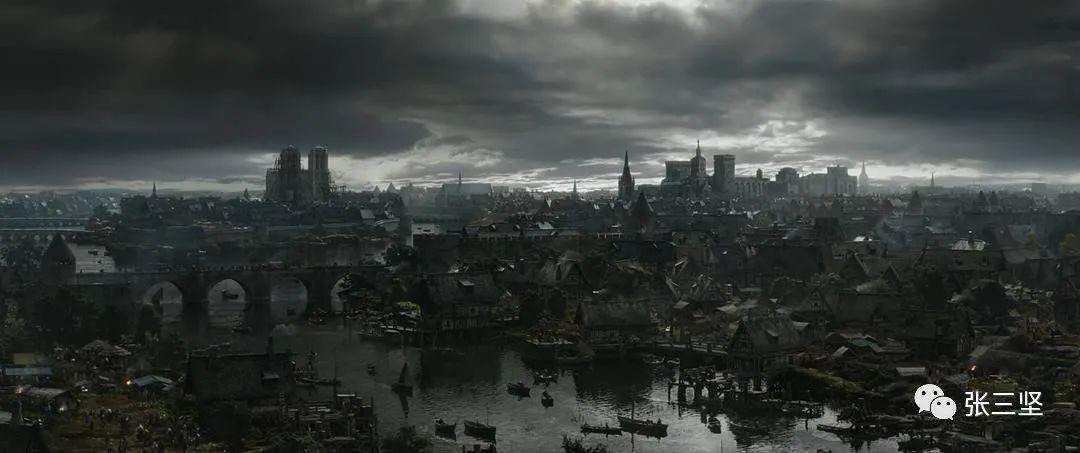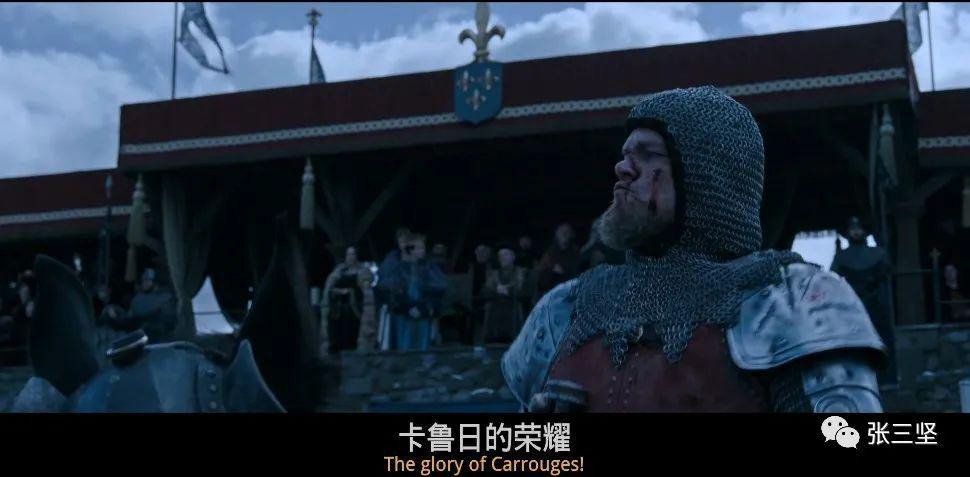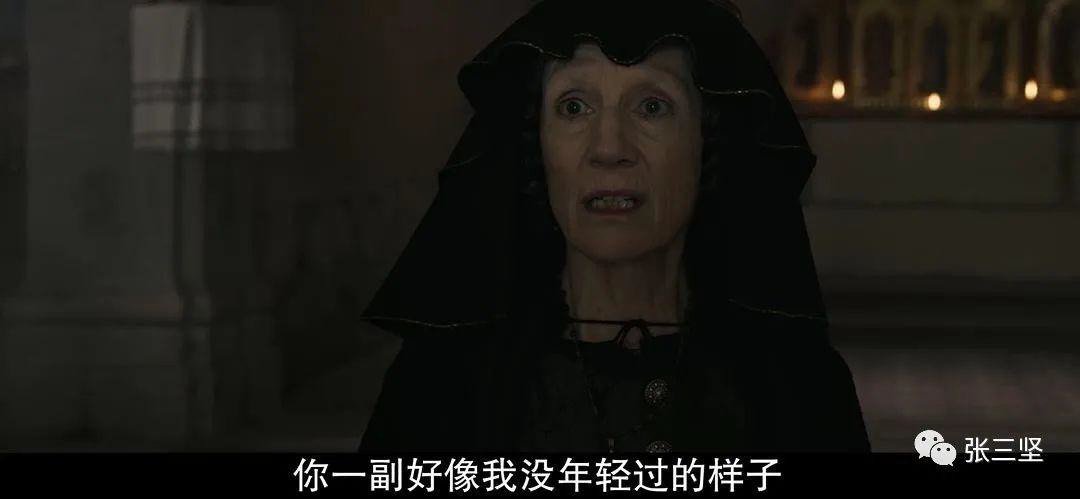The Last Duel
Zhang Sanjian 2022-01-22 20:00
The film employs a narrative technique that uses a circular storytelling method, with the story beginning in reverse after the initial clash between the two knights during their duel.
I really like this narrative style. The story features three main characters, Jean de Carrouges, Marguerite, and Jacques Le Gris. The film is told from the perspectives of these three main characters because each person’s role, perspective, and attitude in the same event are different. Through these three different viewpoints, we can see conflicts among human nature, power struggles, and the status of women in feudal society.
The casting for this movie is very successful. The characters have distinctive appearances and personalities, with clear contrasting traits. Carrouges is like a fierce lion, Marguerite is the embodiment of beauty, and Le Gris is a tall and elegant knight (even though it doesn’t match my aesthetics, it might align with the French aesthetic).
The core of the story is that Marguerite is raped by Le Gris, and upon informing her husband, Carrouges demands a royal trial for Le Gris. However, due to the corruption of the authorities and the low status of women, they are unexpectedly asked to undergo a life-or-death duel as a means of settling the matter, guided by divine intervention.
In the three segments of recollections, I found some interesting points of conflict. For example, at the beginning of the film, in Carrouges’ recollection, he saved Le Gris’ life during a war. However, in Le Gris’ recollection, he saved Carrouges’ life. Due to the chaotic nature of war without a third witness, it becomes a question of who actually saved whom. This question plants the seeds of resentment in both of their hearts.
The two gentlemen have completely contrasting personalities. One comes from humble beginnings, relatively smooth, gentlemanly, and has a certain mathematical talent. As a result, he gains the favor of the corrupt politician Count D’Alençon and colludes with power. The other is a knight of noble birth, straightforward, impulsive, and fierce. After marrying Marguerite, he doesn’t receive the land he was entitled to, and instead, it is awarded to Le Gris, further exacerbating the conflict between them.”
A year later, Carrouges, feeling ostracized, took Marguerite’s advice and hoped to resolve their conflict in a friendly manner. However, an unfortunate incident occurred at a gathering that sowed the seeds of disaster. During this gathering, Le Gris met Carrouges’ beautiful wife Marguerite for the first time and was deeply attracted to her. In his view, Marguerite’s friendly and kind gestures were all attempts to seduce and tease him. Meanwhile, in a conversation with her friend, Marguerite praised Le Gris for his handsome appearance, setting the stage for the later trial. Le Gris couldn’t resist Marguerite’s beauty and her seemingly endless “affection” for him. When Carrouges was away, and the castle was empty, he brutally raped Marguerite…”
Marguerite resisted with all her might, screamed desperately, but couldn’t stop Le Gris’s beastly act! After overcoming immense psychological fear, Marguerite mustered the courage to reveal this fact to her husband, Carrouges. As a knight, Carrouges had to fight for the dignity of himself and his family!
The film shifts to the courtroom. During the lengthy appeal, Marguerite is six months pregnant and already quite visibly pregnant.
The reason for the lengthy trial, which eventually requires a trial by combat to determine “God’s will,” is due to the corruption of the feudal society. The superstitious feudal society believed that women could only become pregnant through “pleasure,” and that a woman who was raped could not become pregnant, leading to the accusation that Marguerite had consented to the act (which is a shocking perspective!). In the eyes of Gris, he tried to justify himself by claiming, “I didn’t want to commit a crime, you seduced me into committing it,” using this as his defense. Additionally, Marguerite’s friend testified falsely, suggesting that Marguerite’s words were a deliberate setup.
What struck me the most in the film is that when Marguerite learns that if her husband loses in this duel, she will not only suffer the pain of losing her husband, but she and her unborn child will also be tied to a high tower and burned alive. This seemingly fair duel was already unfair from the moment it was allowed. The “stakes” at both ends of the balance were three lives on one side and one life on the other.
The intertwined stories of the three main characters make me think that our own worlds are self-centered, and we have never seen the world from others’ perspectives or walked in their shoes. Taking the example of the closest blood relationships, parents may not necessarily understand their children, and children may not necessarily understand their parents.
In Carrouges’ eyes, he sees himself as confident, powerful, and mighty, respectful, considerate, and tolerant towards his wife. But how does Marguerite view her husband? Selfish, arrogant, and reckless, someone who acts without considering others’ opinions. This includes their sexual life as a couple, where she does not experience any pleasure, but only satisfies her husband’s impulsive desires.
When Marguerite was asked if she would still maintain her accusation if her husband lost and she would be burned alive on the tower, she didn’t back down. She was surprised that her husband had not been completely honest with her, but her courage overcame her fear. She represented the women of that era who fought for their rights and interests.
In her moment of struggle, she remembered the words of Carrouges’ mother, “Who do you think you are? My son may die. You will only bring shame to our family. The truth doesn’t matter. You act as if I’ve never been young; I’ve been raped too, despite my resistance, feeling disgust. Did I go crying to my husband? He has more important things to worry about. No, I stood up and continued living.”
The ending of the film returns to the duel, with Carrouges emerging as the victor. Is this truly the will of God?














Visit again ❤️
翻译 Translate
Trials by sword like those were not unusual in medieval Europe as honor weighed more than lives at least for those of any status. And while ‘honor’ was a hollow word when it came to the high nobility, between knights it had been paramount. The role of a woman was not much more than a token to be traded for status, the envy of others, and last but not least to be ‘used to secure a bloodline’. Nothing to be proud of but still part of the society that developed into what we live in now, where mostly ‘value’, ‘truth’, and ‘justice’ are such fluid things, a blink changes it over nothing.
There is a saying: “History is always written by the victors”. And while technically Marguerite ‘wins’ this case as her husband wins the duel, her situation does not change in the slightest. There is still a man who does not care for her wishes, pleasure, or life and who has control (actually really possession) of her. Well ok. It does. But merely for the worse. Her speaking up had brought her nothing but exclusion from her peers as Carrouges’ mother represents those silent masses who had endured silently. What the movie is not talking about are the consequences of her actions.
While she did ‘objectively’ the ‘right thing’ to speak up about injustice, on a big scale it changed nothing to the positive neither for her nor for others. One preditor less, but the amount of grief this will cause makes one think back to the last book you read and wrote about. Specifically, the example with the ‘goatherders’, while not absolutely applicable.
Marguerite is quite a libertine in this era to try and speak up. But most surely it made her and her child outcasts and did indeed bring shame to the family. The man was not able to protect what’s ‘his’, to name just one point of the logic used at those times. A man unable to control/educate his wife, being another. While the child will be born because abortion was a) dangerous and b) sacrilegious, it will be not just a bastard, and thus worth nothing in medieval society, it will be also burdened by its mother status and the guilty verdict of ‘god’ of its father.
One would think we outgrew such mentality as a society, as the human race. But we didn’t. So little can destroy a life no matter what the truth is. So little can destroy a person (mentally). We are still fighting for the same things Marguerite fought in this movie and there is still no end in sight. I would love to say that at least today no one can stop us from spreading the truth even if people are not listening, but I think all of us here know that that’s not true either :/
翻译 Translate
I still didn’t watch it yet.
翻译 Translate
We live to manage the conflict of interest until the last breath.😓
翻译 Translate
The winner tell the story.
翻译 Translate
Stories like those in “Rashomon” illustrate that many truths in this world are merely a matter of perspective from the person recording them.
翻译 Translate